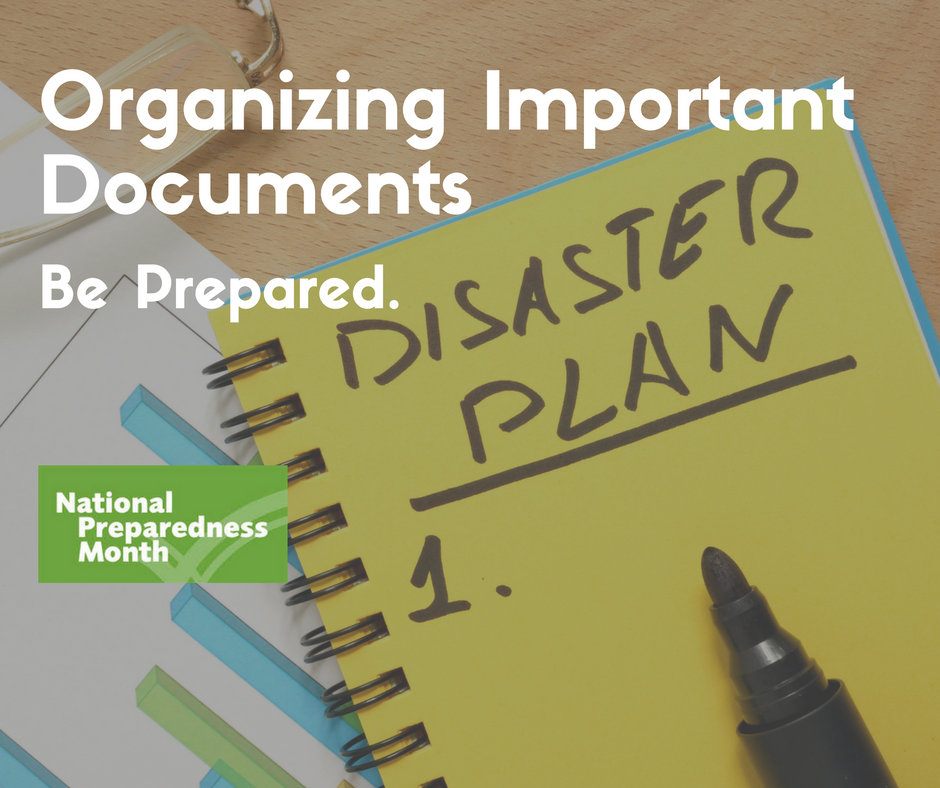
Fantastic Options for Your Charitable Donations in DFW
September 16, 2016
Fall-ing for Fall Fashion: “Anything Goes” this Season
September 21, 2016In honor of September being National Preparedness Month, we would like to help you get started on your journey to being prepared for just about anything. Of course, in a true immediate disaster the most important things are gathering your family members, and having access to first aid, food and water. Beyond these basic things, it is also necessary to gather your most important documents. Here is a list of what we believe to be most important to have access to in a time of emergency. This list is long, however we have some ideas for making this gathering process easier…so keep reading!
List of your most important documents:
- Home Inventory
- Insurance Policies – house, life, car, property, boat
- Wills – make sure you review and update your will on a regular basis
- Property Deeds – to prove you own the house and land
- Titles to vehicles
- Tax Returns
- Contracts – business you are doing or having done
- Stocks and Bonds, or other investments
- Bank Account Numbers
- Credit Card Numbers and company phone numbers
- Driver’s Licenses
- Social Security cards
- Health Insurance Cards
- List of prescription medicines
- Immunization records
- Important Pet records (Vet records, microchip numbers, etc…)
- Phone Numbers – relatives, employer, insurance agent, doctor, pastor, financial advisor, repair contractor
- List of Passwords to important online accounts
- Birth certificates
- Marriage certificates
- Death certificates
- Passports (and/or VISAs)
- Your most important Family Photos – most likely irreplacable so keep scanned images and/or negatives remotely
These documents should be stored as follows:
- Originals kept in your safe deposit box.
- Copies of the originals can be kept in a waterproof pouch in your emergency kit at home (in a waterproof safe or box is preferred).
- Scanned electronic copies should be kept in a safe place on the internet (Dropbox, or similar cloud storage location).
The U.S. Government has provided a wealth of information on being prepared for disasters on their website: https://www.ready.gov/kit. One of the most useful documents they have developed to help us gather our most important information is the “Emergency Financial First Aid Kit (EFFAK)”. Here is a direct link to the EFFAK PDF in English. There is also a version in Spanish and an English reader-enabled version that can be filled out online, visit https://www.ready.gov/kit for more helpful information.
Making the process easier
To make this process easier, we suggest that you use a spreadsheet and refer to it as your “Most Important Documents” list. Type up a list such as the one we have provided above, and check off the items on your spreadsheet as you gather them. This spreadsheet can also help you to periodically update things such as wills and insurance policies by typing in the dates each document was updated. This master list can be printed and kept with the hard-copies you are keeping in your safety deposit box and in your waterproof box or safe at home.
If all of this feels overwhelming, we can help you execute a plan to accomplish this task. Contact us for a quick consultation.





1 Comment
[…] if you haven’t already… now is the perfect time to click over to read it. Here is a link to The S&O Guide to being Prepared for (Almost) Anything: Organizing Your Most Important Documents.Stylishly OrganizedPosted August 29, […]